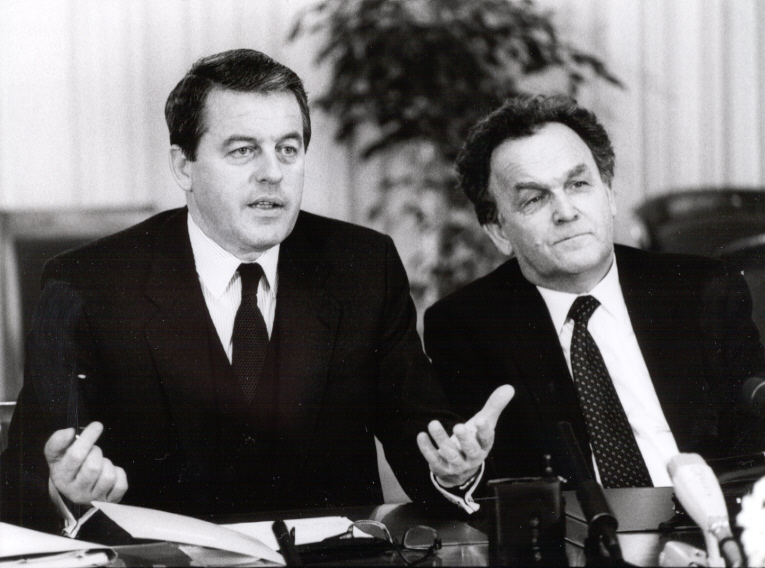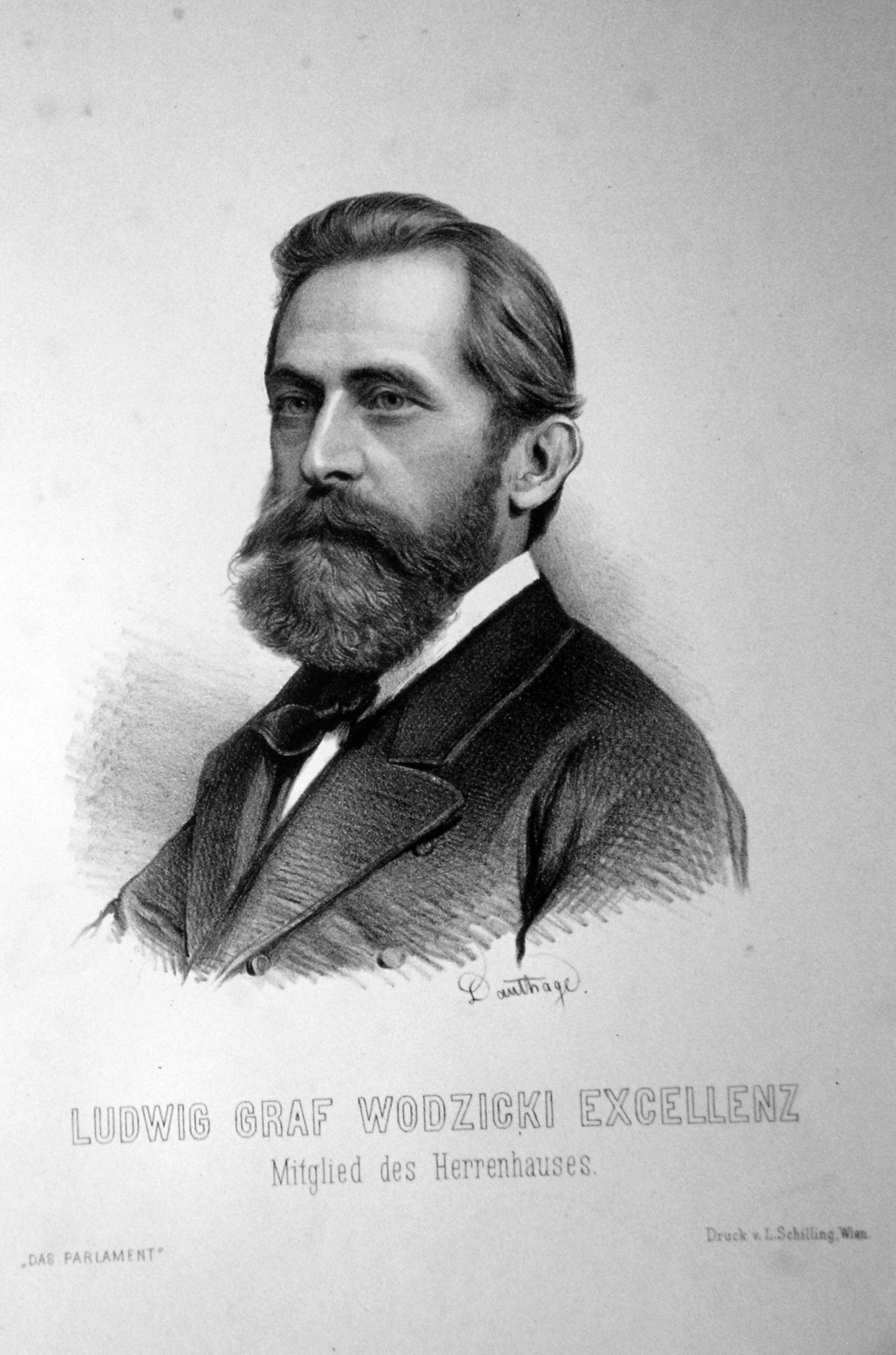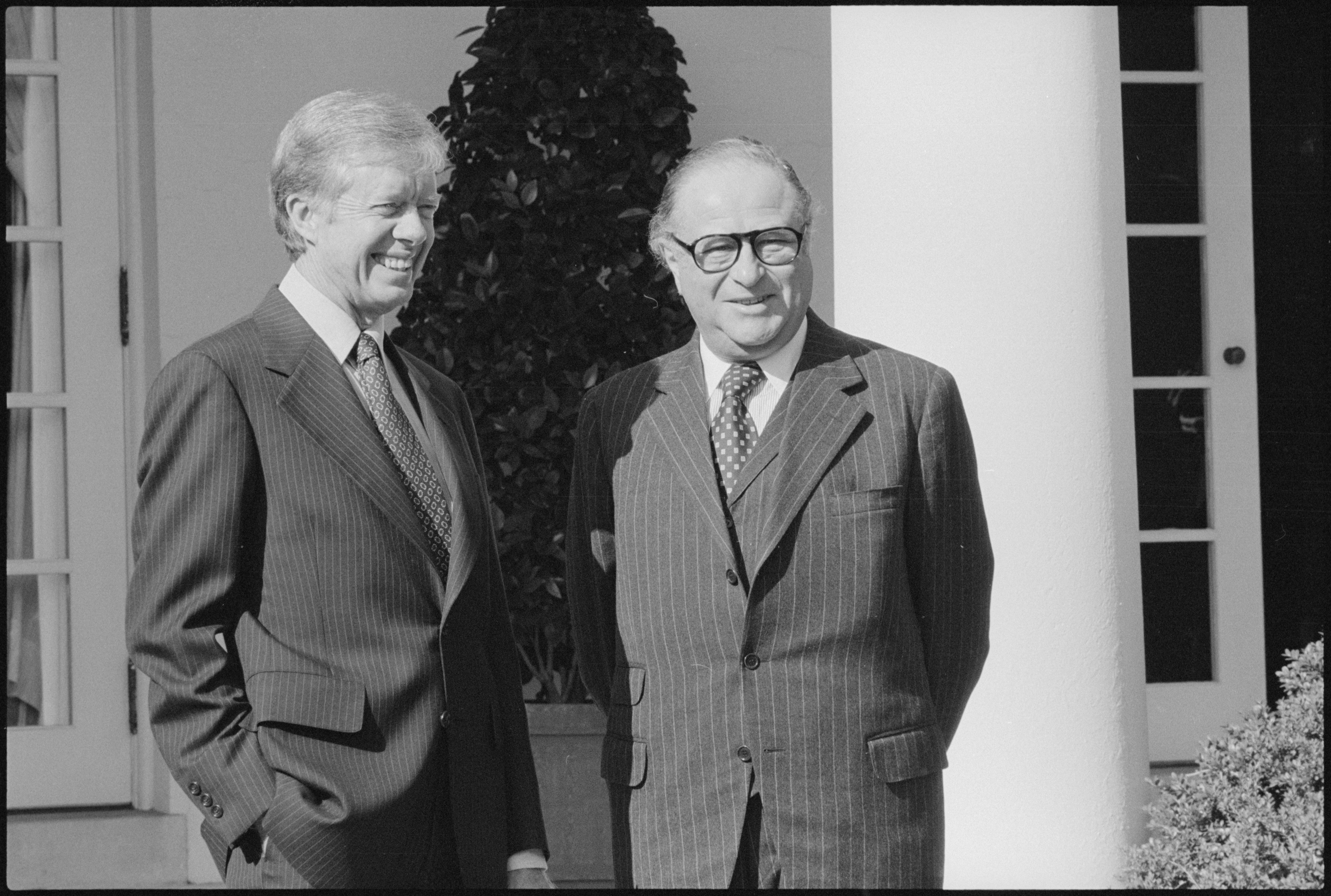|
Franz Vranitzky
Franz Vranitzky (; born 4 October 1937) is an Austrian politician. A member of the Social Democratic Party of Austria (SPÖ), he was Chancellor of Austria from 1986 to 1997. Early life and career As the son of a foundryman, Vranitzky was born into humble circumstances in Vienna's 17th district. He attended the Realgymnasium Geblergasse and studied economics, graduating in 1960. He financed his studies teaching Latin and English and as a construction worker. As a young man, Vranitzky played basketball and was a member of Austria's national team, which in 1960 unsuccessfully tried to qualify for the 1960 Summer Olympics in Rome. In 1962, Vranitzky joined the Social Democratic Party of Austria (SPÖ). In 1962, Vranitzky married Christine Christen, with whom he fathered two children. Vranitzky began his career in 1961 at Siemens-Schuckert, but within the year switched to Austria’s central bank Oesterreichische Nationalbank. In 1969, he received a doctorate in International busin ... [...More Info...] [...Related Items...] OR: [Wikipedia] [Google] [Baidu] |
Chancellor Of Austria
The chancellor of Austria, officially the federal chancellor of the Republic of Austria (), is the head of government of the Austria, Republic of Austria. List of chancellors of Austria, Twenty-nine people have served as chancellor. The current holder of the office Christian Stocker was sworn in on 3 March 2025 as chancellor. The chancellor's place in Austria's political system Austria's chancellor chairs and leads the cabinet of Austria, cabinet, which is composed of the chancellor, the Vice-Chancellor of Austria, vice chancellor and the Minister (Austria), ministers. Together with the President of Austria, president, who is head of state, the cabinet forms the country's Supreme executive organ (Austria), executive branch leadership. Austria is a parliamentary republic, the government, system of government in which real power is vested in the head of government. However, in Austria most executive actions of great extent can only be exercised by the president, upon advice o ... [...More Info...] [...Related Items...] OR: [Wikipedia] [Google] [Baidu] |
Social Democratic Party Of Austria
The Social Democratic Party of Austria ( , SPÖ) is a social democratic political party in Austria. Founded in 1889 as the Social Democratic Workers' Party of Austria (, SDAPÖ) and later known as the Socialist Party of Austria () from 1945 until 1991, the party is the oldest extant political party in Austria. Along with the Austrian People's Party (ÖVP), it is one of the country's two traditional major parties. It is positioned on the centre-left on the political spectrum. Since June 2023, the party has been led by Andreas Babler. It is currently the third largest of five parties in the National Council, having won 41 of 183 seats and 21.1% of the popular vote in the 2024 Austrian legislative election. It holds seats in the legislatures of all nine states; of these, it is the largest party in three ( Burgenland, Carinthia, and Vienna.) The SPÖ is supportive of Austria's membership in the European Union, and it is a member of the Progressive Alliance and Party of Euro ... [...More Info...] [...Related Items...] OR: [Wikipedia] [Google] [Baidu] |
UN Secretary General
The secretary-general of the United Nations (UNSG or UNSECGEN) is the chief administrative officer of the United Nations and head of the United Nations Secretariat, one of the United Nations System#Six principal organs, six principal organs of the United Nations. The role of the secretary-general and of the secretariat is laid out by Chapter XV of the United Nations Charter, Chapter XV (Articles 97 to 101) of the United Nations Charter. However, the office's qualifications, selection process and tenure are open to interpretation; they have been established by custom. Selection and term of office The secretary-general is appointed by the United Nations General Assembly, General Assembly upon the recommendation of the United Nations Security Council, Security Council. As the recommendation must come from the Security Council, any of the five United Nations Security Council veto power, permanent members of the council can veto a nomination. Most secretaries-general are compromi ... [...More Info...] [...Related Items...] OR: [Wikipedia] [Google] [Baidu] |
Austrian People's Party
The Austrian People's Party ( , ÖVP ) is a Christian-democratic and liberal-conservative political party in Austria. Since January 2025, the party has been led by Christian Stocker (as an acting leader). It is currently the second-largest party in the National Council, with 51 of the 183 seats, and won 26.3% of votes cast in the 2024 legislative election. It holds seats in all nine state legislatures, and is part of government in seven, of which it leads six. The ÖVP is a member of the International Democracy Union and the European People's Party. It sits with the EPP group in the European Parliament; of Austria's 19 MEPs, 5 are members of the ÖVP. It is the second largest party in Europe by membership. An unofficial successor to the Christian Social Party of the late 19th and early 20th centuries, the ÖVP was founded immediately following the re-establishment of the Republic of Austria in 1945. Since then, it has been one of the two traditional major parties in A ... [...More Info...] [...Related Items...] OR: [Wikipedia] [Google] [Baidu] |
Freedom Party Of Austria
The Freedom Party of Austria (, FPÖ) is a political party in Austria, variously described as far-right, right-wing populist, national-conservative, and Eurosceptic. It has been led by Herbert Kickl since 2021. It is the largest of five parties in the National Council, with 57 of the 183 seats, and won 28.85% of votes cast in the 2024 election and it is represented in all nine state legislatures. On a European level, the FPÖ is a founding member of the Patriots.eu (originally the Movement for a Europe of Nations and Freedom) and its six MEPs sit with the Patriots for Europe (PfE) group following the dissolution of its predecessor, Identity and Democracy (ID). The FPÖ was founded in 1956 as the successor to the short-lived Federation of Independents (VdU), representing pan-Germanists and national liberals opposed to socialism and Catholic clericalism, represented by the Social Democratic Party of Austria (SPÖ) and the Austrian People's Party (ÖVP), respectively. ... [...More Info...] [...Related Items...] OR: [Wikipedia] [Google] [Baidu] |
Länderbank
The Länderbank, full original name k. k. privilegierte Österreichische Länderbank (), was a major Austrian bank, created in 1880. In 1922 its head office was moved to Paris under the name Banque des Pays de l'Europe Centrale (BPEC, , ), even though its activity remained overwhelmingly in the Austrian operations. After the 1938 Anschluss the latter came under control of Dresdner Bank by the name Länderbank Wien. It was nationalized in 1946, renamed Österreichische Länderbank AG in 1948, and eventually merged in 1991 with Vienna's Zentralsparkasse to form Bank Austria, which in turn has been a subsidiary of UniCredit since 2005. Habsburg era The Länderbank was founded on as a part-owned subsidiary of Paris-based Union Générale, first chaired by Galician aristocrat . Union Generale's promoter intended it as a conservative Catholic project against the financial power of the Jewish Rothschild family which led Austria-Hungary's largest bank, the Creditanstalt. In 1881 it s ... [...More Info...] [...Related Items...] OR: [Wikipedia] [Google] [Baidu] |
Creditanstalt
The Creditanstalt (sometimes Credit-Anstalt, abbreviated as CA), full original name k. k. priv. Österreichische Credit-Anstalt für Handel und Gewerbe (), was a major Austrian bank, founded in 1855 in Vienna. From its founding until 1931, the Creditanstalt was led by members of the Rothschild family, who were among its significant shareholders. Its historically consequential failure in 1931 led to a merger engineered by the Austrian government in 1934, in which it combined with the Wiener Bankverein and the sound parts of the Niederösterreichische Escompte-Gesellschaft to form Österreichische Creditanstalt – Wiener Bankverein, later abbreviated to Creditanstalt-Bankverein. The latter came under the control of Deutsche Bank following the Anschluss in 1938, was nationalized in 1945, and was eventually acquired in 1997 by Bank Austria to form Bank Austria-Creditanstalt, since 2005 a subsidiary of UniCredit. UniCredit phased out the Creditanstalt brand in 2008. Foundation an ... [...More Info...] [...Related Items...] OR: [Wikipedia] [Google] [Baidu] |
Bruno Kreisky
Bruno Kreisky (; 22 January 1911 – 29 July 1990) was an Austrian social democratic politician who served as foreign minister from 1959 to 1966 and as chancellor from 1970 to 1983. Aged 72, he was the oldest chancellor after World War II. Kreisky's 13-year tenure was the longest of any chancellor in republican Austria and, as an influential political figure in Western European social democracy, he worked closely with likeminded leaders Willy Brandt of West Germany and Olof Palme of Sweden in Socialist International. Life and political career Kreisky was born in Margareten, a district of Vienna, to a non-observant Jewish family. His parents were Max (Markus) Kreisky (1876, Klattau – 1944) and Irene Kreisky née Felix (1884, Třebíč – 1969). His father worked as a textile manufacturer. 100th anniversary of the birth of Bruno Kreisky, 11 January 2011 Shocked by the level of poverty and violence in Austria during the 1920s, he joined the youth wing of the Socialist Part ... [...More Info...] [...Related Items...] OR: [Wikipedia] [Google] [Baidu] |
Hannes Androsch
Johannes "Hannes" Androsch (; 18 April 1938 – 11 December 2024) was an Austrian businessman, consultant and Social Democrat politician. He served as an Austrian Finance Minister from 1970 to 1981, and as Vice Chancellor from 1976 to 1981. As a banker, from 1981 to 1988 he was the general director of the Creditanstalt-Bankverein (Austria’s leading bank at that time), and subsequently an advisor to the World Bank. From 1989 onward he built an industrial investment group, Androsch International Consulting (AIC), which is a major factor in Austria's internationally active corporate landscape. In addition, Androsch's foundation is an important sponsor of research and development activities in Austria, where he was regularly consulted on matters of political, economic and financial importance. Youth and early political activities Androsch was born on 18 April 1938 in Vienna, where his parents, Hans and Lia, were tax advisors in the district Floridsdorf. The family lived through ... [...More Info...] [...Related Items...] OR: [Wikipedia] [Google] [Baidu] |
Oesterreichische Nationalbank
The (, , abbr. ) is the National central bank (Eurosystem), national central bank for Austria within the Eurosystem. It was the Austrian central bank from 1923 to 1938 and from 1945 to 1998, issuing the Austrian schilling, shilling. It started operations on under the economic assistance provided to Austria by the Economic and Financial Organization of the League of Nations, replacing the Austro-Hungarian Bank with its name recalling that of the Austro-Hungarian Bank's predecessor entity founded in 1816. It was liquidated following the Anschluss in March 1938, and re-established in July 1945. The OeNB is a Aktiengesellschaft, joint-stock corporation governed by special legislative provision. Its entire capital of €12 million has been held by the Austrian federal government since May 2010, with shareholder rights exercised by the Minister of Finance. Before 2010, half of the capital was in the hands of employer and employee organizations as well as banks and insurance ... [...More Info...] [...Related Items...] OR: [Wikipedia] [Google] [Baidu] |
Siemens-Schuckert
Siemens-Schuckert (or Siemens-Schuckertwerke) was a German electrical engineering company headquartered in Berlin, Erlangen and Nuremberg that was incorporated into the Siemens AG in 1966. Siemens Schuckert was founded in 1903 when Siemens & Halske acquired Schuckertwerke. Subsequently, Siemens & Halske specialized in communications engineering and Siemens-Schuckert in power engineering and pneumatic instrumentation. During World War I Siemens-Schuckert also produced aircraft. It took over manufacturing of the Protos vehicles in 1908. In World War II, the company had a factory producing aircraft and other parts at Monowitz near Auschwitz. There was a workers camp near the factory known as Bobrek concentration camp. The Siemens Schuckert logo consisted of an S with a smaller S superimposed on the middle with the smaller S rotated left by 45 degrees.Siemens used this as a theme for their logos with absorbed companies: Siemens & Halske's logo was a large S with a small superimp ... [...More Info...] [...Related Items...] OR: [Wikipedia] [Google] [Baidu] |





